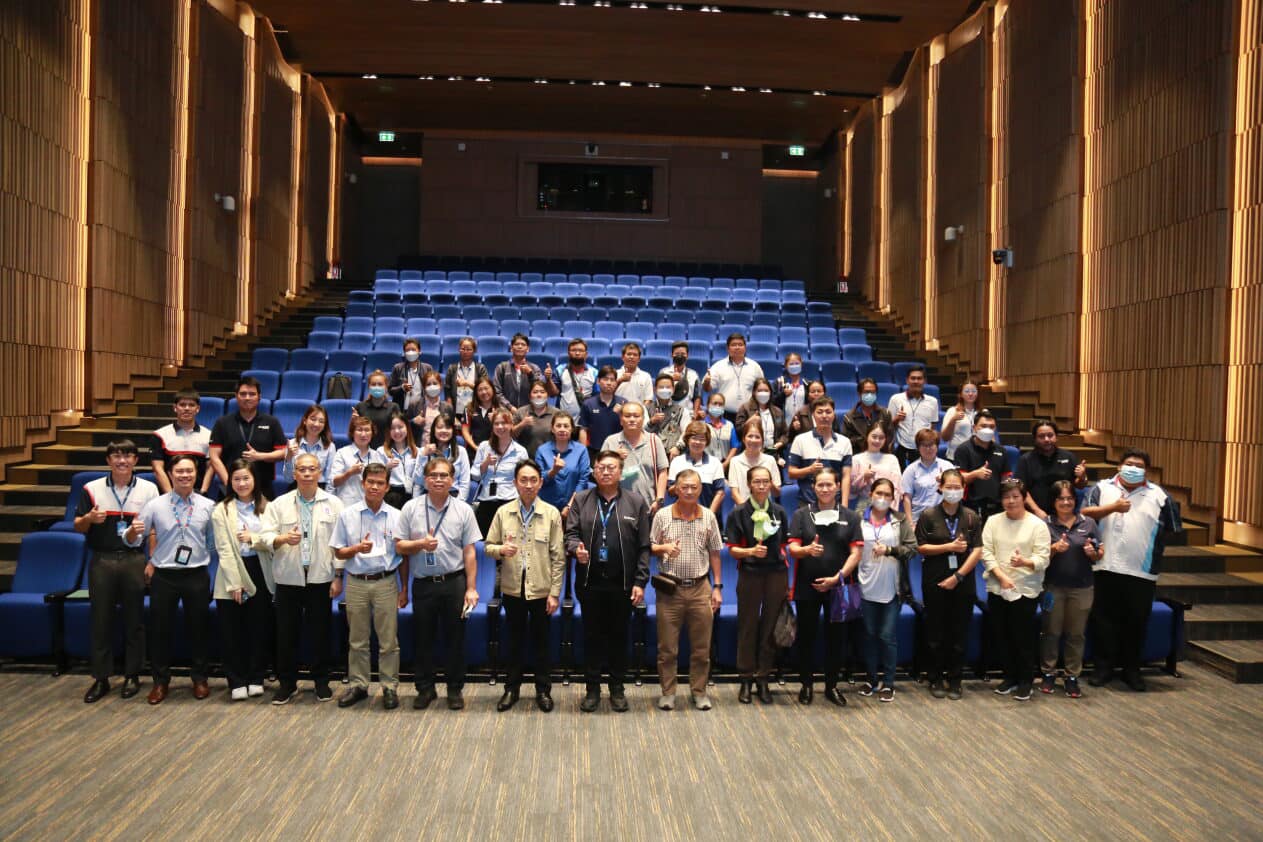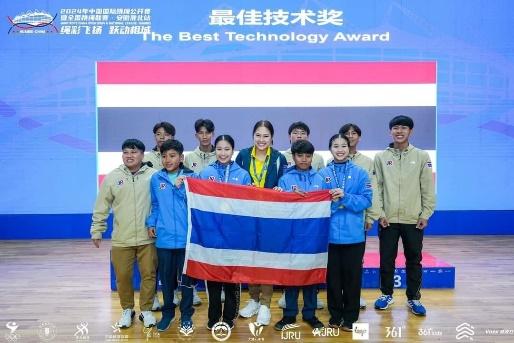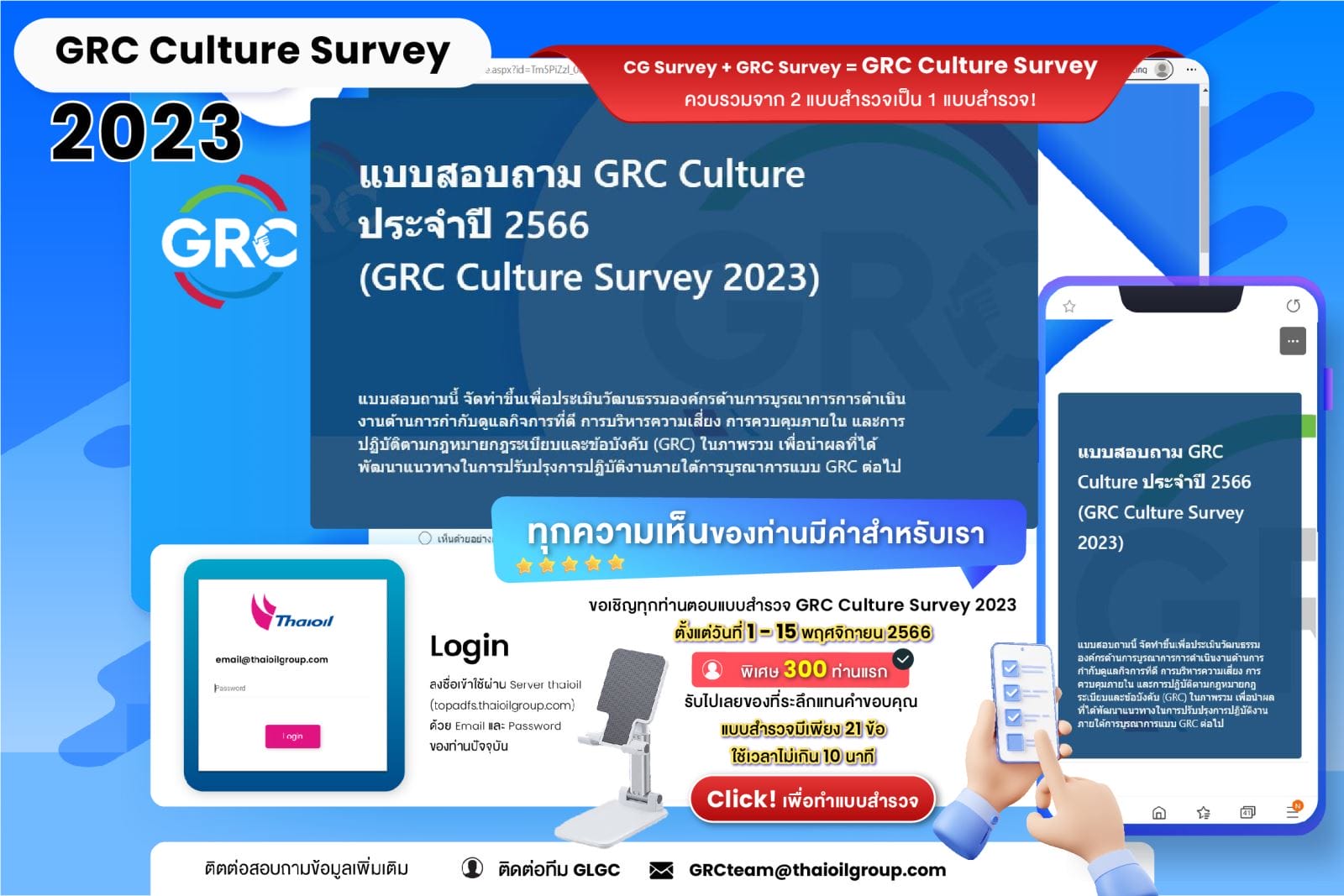Corporate Governance
Corporate Governance
Challenges, Risks,
and evolving laws and regulations that significantly impact and intensify the conduct of business. Hence, Thaioil Group has prioritized the governance principles as a guideline to prevent unethical pursuits of benefits and adapt to forthcoming changes and business transformations.



This fosters fairness for all stakeholders, yielding maximum benefits for shareholders, and ensuring sustainable business operations.
Management Approach
Thaioil Group adheres to the principles of good corporate governance as a fundamental cornerstone in conducting business, serving as a strong foundation for fostering integrity, transparency,Enhancing organizational efficiency.
This core principle is integral to driving sustained success and growth.



Board Governance and Composition
In order to maximize the benefits derived from the dedication and commitment of the Board members in performing their duties efficiently, the Company has determined the maximum number of the Board members according to the requirement of the listed company on the Stock Exchange of Thailand to not exceed three companies. This count includes the members serving on behalf of the Company.
The Board of Directors
consists of a minimum of five (5) and a maximum of fifteen (15) members, while at least half of the total number of directors must have a registered address in Thailand. Directors may or may not be shareholders of the Company and must not exceed 70 years of age as stipulated in the Company’s bylaws. The Board of Directors is appointed by the shareholders at the annual general meeting or appointed by the Board itself by appointing the Nomination and Remuneration Committee to perform the duties of recruiting and selecting directors and top executives in the event of vacant positions.
The composition of the Board of Directors
must include a sufficient proportion of independent directors that are capable of overseeing and balancing the workings of the Board and the operations of the management. The Board of Directors must comprise at least one-third of independent directors with a minimum of three (3) individuals. Currently, the Company has more independent directors than required by law.
The qualifications of the Board of Directors
comprise individuals with capability, credibility, and general acceptability. There must be diversity in skills, knowledge, and expertise, encompassing energy/ petroleum/ petrochemicals, engineering, accounting/ finance, law, economics, political science/ social sciences, security, information technology/ digital, business management/ organizational management/ corporate governance, as well as science/ innovation/ environmental aspects. The Board must include individuals with a minimum of three (3) directors who are knowledgeable about the Company’s business, at least one (1) director in law, and at least one (1) director in accounting/ finance. Additionally, the Board Skill Matrix is prepared on a structured table displaying the skills, knowledge, and expertise of the Company’s Board of Directors as follows:
Board Election Process
Thaioil Group has established criteria for the Board’s election and appointment procedures in compliance with legal requirements and pertinent criteria as outlined in the Corporate Governance (CG) manual. Furthermore, the Company has established a diversity policy for the selection and process of appointing directors, where the Company’s nomination criteria stipulate that directors must hold qualifications that comply with laws and regulations, considering experience, knowledge, and skills that benefit the business, and diversity of gender, race, ethnicity, nationality, or country of origin. The Company also values directors’ diversity of expertise and has developed a Board Skill Matrix aligned with business strategies to assist in the selection process. This ensures the Board possesses diverse expertise aligned with Thaioil’s business strategy. The Company conducts a search for suitable candidates from the State Enterprise Directors’ Pool compiled by the State Enterprise Policy Committee and the list of professional directors in the Thai Institute of Directors Directory (IOD Chartered Director), which collates individuals with knowledge, abilities, and expertise in various domains. The Board of Directors, comprising those who are generally recognized and capable, will be elected by shareholders at the annual general meeting. Each year, a certain number of Board members completed the term as required by the Company’s Articles of Association (AOA); however, they may be re-nominated and re-elected on an individual basis upon receiving majority votes of the shareholders who attend the meeting and casting their votes.
Directors’ Remuneration
Board of Directors appoints the Nomination and Remuneration Committee (NRC) to perform the duties of considering, reviewing and proposing a remuneration framework. This Committee evaluates and recommends compensation that aligns with the responsibilities of the Directors, the Company’s performance, the overall economic situation, and benchmarking against similar companies within the industry. The objective is to set the remuneration package at a level that is motivating and competitive. Subsequently, The NRC will then make a proposal to the Board for endorsement before submission to the Annual General Meeting of Shareholders (AGM) for consideration and approval.
Independent Director’s Qualification
Thaioil Group has clearly defined the qualifications of independent directors, which are aligned more rigorously than those set by the Securities and Exchange Commission’s (SEC) guidelines and the criteria used for evaluation in the Dow Jones Sustainability Indices (DJSI) or MSCI (Morgan Stanley Capital International) Index. Furthermore, the Company specifies that independent directors must maintain independence from major shareholders or groups of major shareholders and from the Company’s management, possessing adequate access to the Company’s financial and business information, as well as other related businesses. This aims to encourage the freedom of expression and opinions to protect minor shareholders’ interests and regularly attend Board meetings.
Name of Directors As of 9th April, 2025 | Independent Director’s Qualification | ||||
DJSI | MSCI (Management) | MSCI (Other Interests)
| SEC
| TOP | |
1. Air Chief Marshal Chanon Mungthanya (Chairman) | |||||
2. Lt. Gen. Apichat Chaiyadar | |||||
3.Police Lieutenant General Thiti Sangsawang | |||||
4. Police Captain Piya Raksakul | |||||
5. Mr. Kris Imsang | |||||
6. Mrs. Pantip Sripimol | |||||
7. Mrs. Pantip Sripimol | |||||
8. Mr. Prajuck Boonyoung | |||||
9. Mr. Nopadhol Pereeroek | |||||
10. Ms. Peangpanor Boonklum | |||||
11. Ms. Phenrasmi Bhuritdhanalert | |||||
12. Dr. Sompop Pattanariyankool | |||||
13. Mr. Prasong Intaranongpai | |||||
14. Ms. Pattaralada Sa-ngasang | |||||
15. Mr. Bandhit Thamprajamchit (Chief Executive Officer and President, and the Secretary to the Board of Directors) | |||||
14 | 10 | 8 | 8 | 8 | |
Board Composition as of 9th April, 2025
Board Composition
Executive Director
1
Non-executive Directors
14
Independent
8
Gender
Male
13
Female
2
Tenure(1)
Average
2.59 year
Board’s meeting attendance(2)
Average
99.52%
Board Position
No excess to
3 listed companies in the stock exchange
Board Composition
1
Executive Director
14
Non-executive Directors
8
Independent Directors
Gender
11
Male
4
Female
Tenure(1)
Average
0.98
Years
Board’s meeting attendance(2)
Average
99.60%
Board Position
No excess to
3
listed companies in the stock exchange
Board Composition
1
Executive Director
14
Non-executive Directors
8
Independent Directors
Gender
11
Male
4
Female
Tenure(1)
Average
0.99
Years
Board’s meeting attendance(2)
Average
99.52%
Board Position
No excess to
3
listed companies in the stock exchange
Remarks:
(1) 8 Independent Director as of 1st January 2025.
(2) Tenure was reported for the year ended as of 31st January 2024.
(3) Board’s meeting attendance was reported for the year ended as of 31st December 2024.


Roles and Responsibilities of the Board of Directors
The Board-committees must possess qualifications that comply with the defined laws and regulations. The Company has defined the qualifications, terms, duties, and responsibilities, reporting scope, and performance evaluation for each Board-committee in a dedicated Board-committee charter. Thaioil has no limitation to the directors’ liabilities, except to the extent permitted by applicable Thai law.
In 2024, the Board of Directors played a pivotal role in overseeing, reviewing, and monitoring the progress of the conduct of business, which can be summarized as follows:
- Approved revisions to the charters of Board-Committee, anti-fraud policy, and the Code of Conduct to ensure greater alignment with regulatory standards and enhanced clarity.
- Monitored progress of various projects related to good corporate governance (CG), corporate social responsibility (CSR), and sustainability (SD)
However, shareholders are responsible for considering and voting on the agenda items proposed at the shareholders’ meeting. A resolution of the shareholders’ meeting shall require:
- In an ordinary event, the majority votes of the shareholders who attend the meeting and cast their votes.
- In the following event such as the sales or transfer of the whole or the substantial part of the company’s business, to purchase or acceptance of transfer of the business of private company or public company by the Company, the making, amending or termination of any agreement respect to the granting of a lease of the whole or substantial parts of the Company’s business, the amendment of the Memorandum of Associations or Article of Association of the Company, increasing or reducing of company capital, the insurance and offering of debentures of the Company, the amalgamation of the business of the Company with other company, the dissolution of the Company or other activities as prescribed by law which are required the shareholders’ meeting approval by a vote of note less than three-fourth (¾) of the total number of the votes of shareholders who attend the meeting and have the right to vote.
Recruitment and Appointment of the CEO & CEO Succession Plan
the Nomination and Remuneration Committee (comprising at least three directors, most of whom must be independent directors) is responsible for establishing the criteria and process for nominating qualified individuals for the Chief Executive Officer (CEO) and directorial positions, reviewing the CEO succession plan, selecting appropriate directors for Board-committees, recommending suitable remuneration based on the Board’s responsibilities for approval at the Annual General Meeting of Shareholders, conducting performance evaluations, and consider to adjust the remuneration rate for the CEO before proposing to the Board of Directors for approvalI.
Board’s Performance Evaluation
1. Evaluation of the overall performance of the Board of Directors,
2. Self-Evaluation of individual board members,
3. Peer-Evaluation of other board members, and
4. Evaluation of the performance of the Board-Committees (the board members of each Board-Committee are required to evaluate the performance of the Board-committees in which they serve only). In addition, the Company has established the policy to conduct a comprehensive assessment of the Board’s performance by independent assessors every three (3) years. This process aims to incorporate received feedback and suggestions to enhance the Board’s practices and operations. An external consultant was engaged to conduct the most recent Board performance evaluation in 2023.
In 2024, the Company conducted a self-assessment using the guidelines and assessment framework that was updated by an independent consultant in 2023. The process, criteria, and results of performance evaluations of the Board of Directors have been reported in the Annual Report (Form 56-1 One Report).



Board Diversity Policy
Thaioil also values directors’ diversity of expertise and has developed a Board Skill Matrix aligned with business strategies to assist in the selection process. Names of qualified directors are considered from the State Enterprise Policy Office’s (SEPO) Director’s Pool and the Thai Institute of Directors Association’ Pool of professional directors (IOD Chartered Directors).
Knowledge and Training Development
- Director Accreditation Program Course (DAP 220/2024)
- Director Accreditation Program Course (DAP 224/2024)
- Advanced Audit Committee Program Course (AACP 53/2024)
- Director Certification Program Course (DCP 365/2024)


Board’s Skill Matrix
illustrating essential skills, knowledge, and expertise aligned with the business strategy, such as energy, petroleum and petrochemicals, accounting and finance, information technology and digital, innovation, and the environment.
The Board should include at least three (3) members with knowledge of the Company’s business, at least one (1) member in law, and at least one (1) member in accounting and finance. Additionally, the Board should consist of independent directors, constituting no less than one-third of the entire Board and no fewer than three (3) members.


Skills Matrix of Thaioil Board of Directors | ||||||||||||||
|---|---|---|---|---|---|---|---|---|---|---|---|---|---|---|
List of directors
as of 9th April, 2025 | Other | |||||||||||||
1.Energy/ Petroleum/ Petrochemicals | 2.Engineering | 3.Accounting/ Finance | 4.Law | 5.Economics | 6.Political Science/ Social Science | 7.Security | 8.BInformation technology/
Digital/ Cyber Security | 9.Science/ Innovation/ Environment | 10.Business Management/ Organizational
Management/ Corporate Governance | 11.Sustainability and Climate
Change Management / Environment | Independent Director | Director Pool./ IOD/ Chartered Director | No. of Mandate in other Listed Companies | |
1. Air Chief Marshal Chanon Mungthanya (Chairman) | 1 | |||||||||||||
2. Lt. Gen. Apichat Chaiyadar | – | |||||||||||||
3. Police Lieutenant General Thiti Sangsawang | – | |||||||||||||
4. Police Captain Piya Raksakul | – | |||||||||||||
5. Mr. Kris Imsang | – | 1 | ||||||||||||
6. Mrs. Pantip Sripimol | – | |||||||||||||
7. Mr. Chookiat Jittimaitriskul | – | |||||||||||||
8. Mr. Prajuck Boonyoung | – | – | ||||||||||||
9. Mr. Nopadhol Pereeroek | – | – | ||||||||||||
10. Ms. Peangpanor Boonklum | – | – | ||||||||||||
11. Ms. Phenrasmi Bhuritdhanalert | – | – | ||||||||||||
12. Ms. Dr. Sompop Pattanariyankool | – | – | ||||||||||||
13. Mr. Prasong Intaranongpai | – | – | – | |||||||||||
14. Ms. Pattaralada Sa-ngasang | – | 1 | ||||||||||||
15. Mr. Bandhit Thamprajamchit (Chief Executive Officer and President, and the Secretary to the Board of Directors) | – | 1 | ||||||||||||
Total | 7 | 3 | 2 | 5 | 5 | 6 | 4 | 0 | 15 | 1 | 8 | 12 | ||
Education
Work experience (shall have working experience in such field not less than 3 years and identify top 5 areas of expertise)
Education with work experience
In 2024, when classified under the Global Industry Classification Standard (GICS) within the Energy Industry sector, Thaioil Group’s Board of Directors possess the following key skills, knowledge, and expertise as follows:
- 6 independent directors and non-executive directors (excluding the CEO and President) have knowledge and experience in the energy, petroleum, and petrochemical industries.
- 2 independent directors and non-executive directors (excluding the CEO and President) have knowledge and experience in risk management.

Success Metrics of Chief Executive Officer
Thaioil Group has established sustainability performance indicators in the fiscal year 2024, which are linked to the remuneration of the Chief Executive Officer (CEO), President, and Sustainability Development Steering Committee. The sustainability performance is also reflected in the Corporate Key Performance Indicators cascaded to all levels of employees in relevant departments. This helps to ensure that the predefined goals are achieved in terms of Environment, Social, and Governance (ESG) management. The components are shown below:
Part 1) Corporate Key Performance Indicators (KPI) Achievements (70%)
Thaioil Group indicates the Key Performance Indicators under the principle of balance scorecard that are aligned with the direction of “TOP for the Great Future”. The Key Performance Indicators are divided into three dimensions as follows:
Business as Usual
45%
ตัววัดกำไรสุทธิจากการดำเนินงาน (Net Operating Profit)
• Net Operating Profit
• Return on Invested Capital (ROIC) 7-Year Average, and ROIC compared with peers in the same industry
• Total Recordable Case Frequency (TRCF) and Process Safety Event Tier-1
• Operational Availability
• Energy Efficiency and GHG Emission
• Cash Operating Cost
• Productivity Improvement
Strategic Initiatives
29%
Strategic Enablers & Sustainability
26%
• Investment Grade Credit Rating
• People & Organization Readiness
• Digitalization
• Innovation
• Stakeholder Engagement (Customer, Community, and Investor)
• Dow Jones Sustainability Indices (DJSI)
Part 2) Leadership Competency (30%)
The assessment of the leadership competency of the CEO and President is conducted in six areas, namely building shared vision, organizational management aligned with strategic plan, risks management, team management toward the highest productivity, ability to coach and mentor, and building personal excellence.
Sustainability performance is assessed by using performance indicators across three areas of balance scorecard and leadership competency.
Remuneration of Chief Executive Officer
The results of these assessments translate into compensation packages. At the present moment, the standard Thaioil compensation package for executives includes base salary, and annual bonus and variable compensation depending on annual performance. These packages are rewarded annually and paid for directly. Our longest performance period and time vesting for variable CEO compensation both currently amount to 1 year each, and we do not use deferred bonus plans.
As stated above, Thaioil provides these compensation packages only after in-depth and comprehensive assessments of each executives’ performance. Should new information surface that bring to question the validity of these compensation packages, Thaioil will refer clawback provision from Section 89 and Section 281/2 of the Securities and Exchange Act, B.E. 2551, which specified that the executive managements shall perform their duties with responsibility, comply with laws, corporate rules, and corporate objectives. The executive managements shall also respond to the meeting resolutions of the board of directors and agreement from the investors. In case any director or executive fails to perform his/ her duties or engages in any misconduct or conduct that violates any law, regulation, or agreement made with the Board and/or investors, he/ she will be required to return compensation and benefits he/ she has received to the company and may be subject to civil penalty and/or criminal punishment.
In 2024
CEO Compensation
The Nomination and Remuneration Committee is responsible for assessing the annual performance and compensation of the CEO such as salary, bonus, and other benefits on behalf of the Board, and submitting them to the Board for approval.
Executives are responsible for overseeing the company’s business and daily activities, while the CEO is the top executive in charge of company management, as entrusted by the Board of Directors. The CEO must also strictly supervise company management in accordance with the work plan and budget approved by the Board of Directors, while demonstrating integrity and accountability, for the best interests of the company and its shareholders.
The CEO, as well as executives at all levels, jointly determine Key Performance Indicators (KPIs) each year linked with long-term strategic direction and business plan (e.g. financial return, key strategic projects execution and key strategic enablers) to ensure corporate KPIs that meet vision and strategic aspiration in long term, in addition to Thaioil’s business achievements, factors supporting sustainable growth, corporate image, and social and community responsibility achieved with transparent and truly beneficial practices.
Remuneration 2024 | CEO | Executive |
|---|---|---|
Base Salary | 9,290,000 | 57,830,000 |
Other cash incentives | 8,941,000 | 38,080,000 |
Total | 18,231,000 | 95,910,000 |
*Sum remuneration of all executive 10 persons EVP level upwards | ||
Employee Compensation 2024 | Median Employee Compensation | Mean Employee Compensation |
|---|---|---|
Median and mean annual compensation
of all employees except CEO | 974,000 | 1,364,000 |
Ratio between annual compensation of
CEO and the mean and median employee compensation | 18.72 | 13.37 |
Thaioil Share Management Ownership Guidelines
Thaioil has established guidelines for the Company’s share ownership to encourage the Chief Executive Officer (CEO), the President, and the Executive Vice President, to own shares in the Company to the extent of 5 to 7 times of their annual base salary. This initiative is aimed at fostering motivation among executives to work in consideration of the shareholders’ benefits and to drive the Company towards long-term sustainable business growth, alongside earning the trust of shareholders.

| Position | Multiple of Annual Base Salary |
| Chief Executive Officer and President | 7 times |
| Other Member of Executive Committees (Executive Vice Presidents) | 7 times |
In 2024, the holding of Company’s share ownership by the Company’s executives, including spouses or cohabiting partners, and underage children is reported in the Annual Report (Form 56-1 One Report)
Share Ownership (As of 31st January 2024) | ||
|---|---|---|
Position | Name(s) | Multiple of Annual Base Salary |
Chief Executive Officer and President | Mr. Bandhit Thamprajamchit | 0.13 |
Average executive members owing shares | Mr. Chatapong Wungtanagorn Mrs. Wanida Boonpiraks Ms. Rungnapa Janchookiat Mr. Nuttapon Meerit Mr. Santi Wasanasiri Mr. Surachai Saengsamran Miss. Somporn Bunluesriruang Ms. Wanwisa Yanchinda | 0.18 |
Mr. Bandit Thamprajamchit holds 42,400 shares (holds 2,400 shares and 40,000 shares by his spouse), Mr. Chatapong Wungtanagorn holds 105,676 shares, Mrs. Wanida Boonpiraks holds 6,585 shares, Ms. Rungnapa Janchookiat holds 100 shares (by her spouse), Mr. Nuttapon Meerit holds 1,000 shares, Mr. Santi Wasanasiri holds 66,576 shares (holds 10,976 shares and 55,600 shares by his spouse), Mr. Surachai Saengsamran holds 107,000 shares, Ms. Somporn Bunluesriruang holds 58,800 shares, and Ms. Wanwisa Yanchinda holds 5,424 shares. | ||


































































